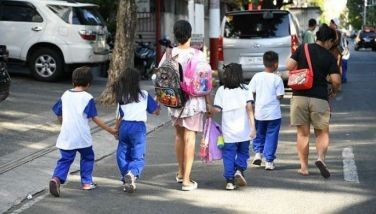Libyan fund to secure hostages' release
An endowment from a Libyan foundation may end this week the Abu Sayyaf hostage crisis in Mindanao.
Chief government negotiator Robert Aventajado said yesterday that a fund from the Gadhafi Foundation will be funneled to the Abu Sayyaf, ostensibly for scholarships and other forms of assistance for the Muslim extremists.
Aventajado made the disclosure as Sulu Gov. Abdusakur Tan met with Abu Sayyaf leaders yesterday in a town hall guarded by some 200 policemen to arrange the start of formal talks for the freedom of 21 mostly foreign hostages seized a month ago.
"This could be over tomorrow or in two or three days," Tan said, referring to the hostage crisis. "It won't be long now."
Aventajado stressed the endowment is not a ransom payment. "It is being offered as a humanitarian gesture," he said.
He also said there is a need for former Libyan ambassador Abdul Rajab Azzarouq, who now represents the Gadhafi Foundation, to remain in the negotiating panel and tell the rebels what the foundation could offer.
Aventajado also clarified that the donations will not go directly to the Abu Sayyaf but to areas controlled by Muslim extremists.
The meeting between Tan and Abu Sayyaf leaders followed an unsuccessful attempt on Monday to start the formal negotiations.
Tan planned to discuss the timing of the start of formal talks and the release of an ailing German hostage, officials said.
"Peace be with you," Abu Sayyaf leader Ghalib Andang said in the Tausug dialect as he waved to reporters before going on a closed-door meeting with Tan.
Andang, who is known as "Commander Robot," was accompanied by another senior Abu Sayyaf leader Mujib Susukan. They arrived in a convoy of three jeeps packed with about 50 Muslim guerrillas armed with assault rifles, their faces covered with black ski masks.
After the meeting, Tan said the rebels have formally presented their demands, but he refused to divulge them, saying he will still submit them for review to Aventajado.
For his part, Andang said they have not yet decided when to release the hostages.
"We have not yet talked about it. We are still looking for peace," he said.
Earlier yesterday, Tan sent an envoy to Abu Sayyaf rebels to determine why they had snubbed the previous day's meeting with Aventajado.
Aventajado returned to Manila from Jolo late Monday after rebel leaders left him sitting in the jungle for more than four hours.
The Abu Sayyaf said they wanted to meet with all the negotiators, including Azzarouq, who is likely to be more supportive of their interests.
They were also apparently spooked by the heavy security at the meeting site on the lawn of a village school on Jolo, near where the hostages are held, Aventajado said.
Troops lined the highway to the village, 500 police officers ringed the meeting site 10 members of the elite presidential guards surrounded Aventajado, assault weapons in hand. The area is a rebel stronghold.
"Perhaps, I have to be a little bolder... I should really go in alone," he later told reporters in Manila.
The rebels are holding three Germans, two French, two Finns, two South Africans, a Lebanese, nine Malaysians and two Filipinos kidnapped from the Malaysian resort island of Sipadan on April 23.
The rebels have given the negotiators a written list of demands, but the demands' heavily political nature makes chances of reaching a common ground seem more remote than when the kidnappers were asking for cash.
Skirmishes between the rebels and troops, changes in the government negotiating team, and the need for security arrangements on the volatile island have delayed formal negotiations, though the rebels have discussed their goals informally with government envoys.
The Abu Sayyaf, the smaller and more radical of two guerrilla groups fighting for an independent Islamic state in Mindanao, brought world attention to a rebellion that has simmered for decades when they kidnapped the tourists and resort employees and brought them to Jolo, about an hour away.
More than 200,000 people have been displaced in recent months by the worst wave of violence in the southern Philippines in years, triggered by clashes between troops and rebels.
The fighting has been limited to the southern part of the country, home of the mostly Christian country's Muslim minority, but several bombs have struck the capital of Manila since the rebels threatened to target large cities.
A bomb exploded in Manila's largest shopping mall on Sunday, killing one person and injuring at least 11 others. The larger rebel group, the Moro Islamic Liberation Front, denied any involvement.
Four days earlier, an explosion at another Manila mall injured 13.
Grenade attacks and a bomb in busy markets in Jolo and the city of Zamboanga, on the nearby island of Mindanao, killed eight people on Thursday and wounded 55 more.
Ten explosions hit towns in heavily Muslim Zamboanga del Sur province late Sunday, police said. No damage or casualties were reported, and no one claimed responsibility, but previous attacks have been blamed on Muslim separatists.
"The police believe the explosions were not meant to harm people but intended to sow terror," said Superintendent Samson Ubay-Ubay of the provincial police.
The Abu Sayyaf's written demands for the release of the hostages are political, not financial, Executive Secretary Ronaldo Zamora said Monday.
They include creation of an independent Islamic state and a commission to examine the plight of Filipinos living in Malaysia's Sabah island, not far from Mindanao, Zamora said.
The government has repeatedly refused to create an Islamic state. President Estrada insists that the government will pay no ransom, but in the Philippines that policy is often subverted by payment of "board and lodging" for captives.
In preliminary talks, the rebels asked for $2 million for the release of ailing German hostage Renate Wallert, 57, officials say.
Her freedom is a priority once talks begin, though her health is improving.
At Malacañang, the President ordered Budget Secretary Benjamin Diokno "to give full support" in the military's effort to look for funds that aim to achieve its "mission" in Mindanao.
Defense Secretary Orlando Mercado asked the President earlier for additional funds for the Mindanao campaign.
Diokno refused to say how much money was being asked by Mercado because the figure "is a highly confidential matter."
But he said there are at least three ways for the government to raise the money. Among these are a realignment of the military's budget for this year, a realignment in the budget of the executive department, and a supplemental budget proposal that would be submitted to Congress.
Meanwhile, Finnish President Tarja Halonen asked Manila to open a supply line to get food, medicine and information to the 21 hostages held by the Abu Sayyaf, Finland's STT/FNB agency reported.
Halonen made the request to Foreign Affairs Secretary Domingo Siazon Jr. and repeated an offer she made last week to intervene personally to help resolve the crisis, said the president's spokeswoman Maria Romantcuk.
"It is about doing something concrete to get medicine, food but also messages and news to the hostages," said Romantcuk.
"The fact is, the hostages need to be better informed about ongoing efforts to get their release," she said.
The idea of a humanitarian supply line also covered guaranteed delivery, she added. "So far, it seems that the parcels sent by the Finnish embassy have never reached those for whom they were intended."
A presidential adviser appealed to the Abu Sayyaf not to use children as shields in their fight against the government.
Jamby Santos Madrigal, presidential adviser for children's affairs who flew to Basilan over the weekend, said she was "appalled to see children being used in battle."
She met with four freed hostages -- Nova Verallo, Lani May Cachuela, Crisalyn Romualdez and Ricardo Gregorio -- who, she said, need psychologists to help heal the wounds of war.
Meanwhile, Rep. Ralph Recto (LAMP, Batangas) urged the Department of Education, Culture and Sports not to drive the 100,000 evacuees temporarily sheltered in school buildings in several areas in Mindanao.
He made the appeal a day after education officials announced that they would retake the buildings in preparation for classes that are due to open next week.
"We should avoid a second evacuation, especially now that the refugees are weak due to hunger and disease," he said.
To balance the interests of evacuees and schoolchildren, the Batangas lawmaker proposed a "time-sharing" arrangement under which the classrooms would be used during the day and evacuation centers at night.
Classes can also be held in government-owned gymnasiums and other buildings, he said.
If these are not enough, local government units can rent private space using their calamity funds, he said.
He added that in areas which the Armed Forces has cleared of terrorists, refugees can be helped to go back to their communities. -- With Jess Diaz, wire reports
- Latest
- Trending




























